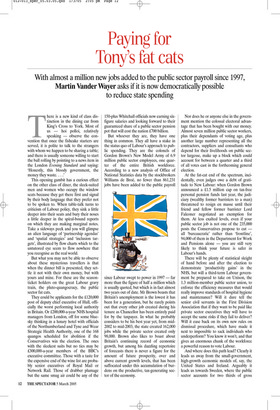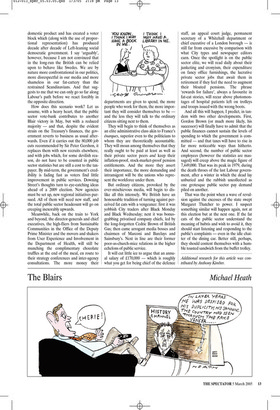Paying for Tony’s fat cats
With almost a million new jobs added to the public sector payroll since 1997, Martin Vander Wayer asks if it is now democratically possible to reduce state spending There is a new kind of class distinction in the dining car from King’s Cross to York. Most of us — hoi polloi, relatively speaking — observe the convention that once the fishcake starters are served, it is polite to talk to the strangers with whom we happen to be sharing a table; and there is usually someone willing to start the ball rolling by pointing to a news item in the London Evening Standard and saying: ‘Honestly, this bloody government, the money they waste....’ This opening gambit has a curious effect on the other class of diner, the sleek-suited men and women who occupy the window seats because they get there first and signal by their body language that they prefer not to be spoken to. When table-talk turns to criticism of Labour policy, they sink a little deeper into their seats and bury their noses a little deeper in the spiral-bound reports on which they are making marginal notes. Take a sideways peek and you will glimpse an alien language of ‘partnership agendas’ and ‘spatial strategies’ and ‘inclusion targets’, illustrated by flow charts which to the untutored eye seem to flow nowhere that you recognise as the real world.
But what you may not be able to observe about these mysterious travellers is that when the dinner bill is presented, they settle it not with their own money, but with yours and mine. For these are the seasonticket holders on the great Labour gravy train, the pluto-quangocracy, the public sector fat cats.
They could be applicants for the £120,000 post of deputy chief executive of Hull, officially the worst performing local authority in Britain. Or £200,000-a-year NHS hospital managers from London, off for some bluesky thinking in a luxury hotel with officials of the Northumberland and Tyne and Wear Strategic Health Authority, one of the 168 quangos scheduled for abolition if the Conservatives win the election. The ones with the sleekest suits but no ties may be £300,000-a-year members of the BBC’s executive committee. Those with a taste for the expensive end of the wine list are probably senior executives of Royal Mail or Network Rail. Those of drabber plumage but the same smug air could be any of the 150-plus Whitehall officials now earning sixfigure salaries and looking forward to their guaranteed share of a public sector pension pot that will cost the nation £700 billion.
But whoever they are, they have one thing in common. They all have a stake in the status quo of Labour’s approach to public spending. They are the colonels of Gordon Brown’s New Model Army of 6.9 million public sector employees, one quarter of the entire British workforce. According to a new analysis of Office of National Statistics data by the stockbrokers Williams de Broë, no fewer than 861,231 jobs have been added to the public payroll since Labour swept to power in 1997 — far more than the figure of half a million which is usually quoted, but which is in fact almost two years out of date. Mr Brown boasts that Britain’s unemployment is the lowest it has been for a generation, but he rarely points out that every other job created during his tenure as Chancellor has been entirely paid for by the taxpayer. In what he probably considers to be his best year yet, from mid2002 to mid-2003, the state created 162,000 jobs while the private sector created only 98,000. Brown also likes to boast about Britain’s continuing record of economic growth, but among his dazzling repertoire of forecasts there is never a figure for the amount of future prosperity, over and above current growth levels, that has been suffocated under this accumulation of burdens on the productive, tax-generating sector of the economy. Nor does he or anyone else in the government mention the colossal electoral advantage that has been bought with our money. Almost seven million public sector workers, plus their dependants of voting age, plus another large number representing all the contractors, suppliers and consultants who depend for their livelihoods on public sector largesse, make up a block which could account for between a quarter and a third of all votes cast in the forthcoming general election.
At the fat-cat end of the spectrum, incidentally, even judges owe a debt of gratitude to New Labour: when Gordon Brown announced a £1.5 million cap on tax-free personal pension funds last year, the judiciary (wealthy former barristers to a man) threatened to resign en masse until their friend and fellow former barrister Lord Falconer negotiated an exemption for them. At less exalted levels, even if your public sector job is not one of the 235,000 posts the Conservatives propose to cut all ‘bureaucratic’ rather than ‘frontline’, 94,000 of them in the Department for Work and Pensions alone — you are still very likely to think your future is safer in Labour’s hands.
There will be plenty of statistical sleight of hand before and after the election to demonstrate ‘productivity gains’ in the NHS, but will a third-term Labour government be prepared to take on Unison, the 1.3 million-member public sector union, to enforce the efficiency measures that would really improve standards of hospital hygiene and maintenance? Will it dare tell the senior civil servants in the First Division Association that if they want to be paid like private sector executives they will have to accept the same risks if they fail to deliver? Will it ease back on its own new rules on dismissal procedure, which have made it next to impossible to sack individuals who underperform? You know it won’t, and that gives an enormous chunk of the workforce a powerful reason to vote Labour.
And where does this path lead? Clearly it leads us away from the small-government, high-growth economic models of, say, the United States and Ireland. Arguably it leads us towards Sweden, where the public sector accounts for two thirds of gross domestic product and has created a voter block which (along with the use of proportional representation) has produced decade after decade of Left-leaning social democratic government. I say ‘arguably’, however, because I am not convinced that in the long-run the British can be relied upon to behave like Swedes. We are by nature more confrontational in our politics, more disrespectful in our media and more shameless in our fat-cattery than the restrained Scandinavians. And that suggests to me that we can only go so far along Labour’s path before we react forcibly in the opposite direction.
How does this scenario work? Let us assume, with a heavy heart, that the public sector vote-bank contributes to another Blair victory in May, but with a reduced majority — and that, despite the evident strain on the Treasury’s finances, the government reverts to business as usual afterwards. Even if it carries out the 80,000 job cuts recommended by Sir Peter Gershon, it replaces them with new recruits elsewhere, and with jobs which, for some devilish reason, do not have to be counted in public sector statistics but are still a cost to the taxpayer. By mid-term, the government’s credibility is fading fast as voters find little improvement in public services. Downing Street’s thoughts turn to eye-catching ideas ahead of a 2009 election. New agencies must be set up, new regional initiatives pursued. All of them will need new staff, and the total public sector headcount will go on creeping inexorably upwards.
Meanwhile, back on the train to York and beyond, the director-generals and chief executives, the high-fliers from Sustainable Communities in the Office of the Deputy Prime Minister and the movers and shakers from User Experience and Involvement in the Department of Health, will still be munching the complimentary chocolate truffles at the end of the meal, en route to their strategy conferences and inter-agency consultations. The more money their departments are given to spend, the more people who work for them, the more important they will consider themselves to be and the less they will talk to the ordinary citizens sitting next to them.
They will begin to think of themselves as an elite administrative class akin to France’s énarques, superior even to the politicians to whom they are theoretically accountable. They will moan among themselves that they really ought to be paid at least as well as their private sector peers and keep their inflation-proof, stock-market-proof pension entitlements. And the more they assert their importance, the more demanding and intransigent will be the unions who represent the workforce under them.
But ordinary citizens, provoked by the ever-mischievous media, will begin to dislike all this intensely. We British have an honourable tradition of turning against perceived fat cats with a vengeance: first it was yobbish City traders after Black Monday and Black Wednesday; next it was bonusgrabbing privatised company chiefs, led by the long-forgotten Cedric Brown of British Gas; then came arrogant media bosses and chairmen of Marconi and Barclays and Sainsbury’s. Next in line are their former poor-as-church-mice relations in the higher echelons of public service.
It will cut little ice to argue that an annual salary of £170,000 — which is roughly what you get for being chief of the defence staff, an appeal court judge, permanent secretary of a Whitehall department or chief executive of a London borough — is still far from excessive by comparison with what City types and newspaper editors earn. Once the spotlight is on the public sector elite, we will read daily about their junketing and cronyism, their expenditure on fancy office furnishings, the lucrative private sector jobs that await them in retirement if they feel the need to augment their bloated pensions. The phrase ‘rewards for failure’, always a favourite in fat-cat stories, will recur above photomontages of hospital patients left on trolleys and troops issued with the wrong boots.
And all this will happen, I predict, in tandem with two other developments. First, Gordon Brown (or much more likely, his successor) will finally have to admit that the public finances cannot sustain the levels of spending to which the government is committed — and that taxes will have to rise in far more noticeable ways than hitherto. And second, the number of public sector employees (however the statistics are massaged) will creep above the magic figure of 7,449,000. That was its peak in 1979, during the death throes of the last Labour government, after a winter in which the dead lay unburied and the rubbish uncollected as one grotesque public sector pay demand piled on another.
That was the point when a wave of revulsion against the excesses of the state swept Margaret Thatcher to power. I suspect something similar will happen again, not at this election but at the next one. If the fat cats of the public sector understand the meaning of hubris and wish to avoid it, they should start listening and responding to the public’s complaints — even in the idle chatter of the dining car. Better still, perhaps, they should content themselves with a humble toasted sandwich from the buffet trolley.
Additional research for this article was contributed by Anthony Kimber.



























































 Previous page
Previous page